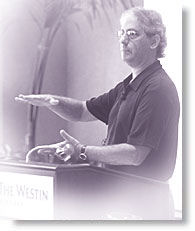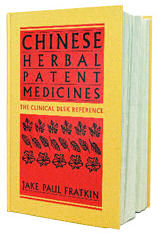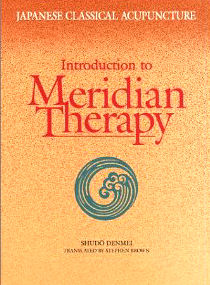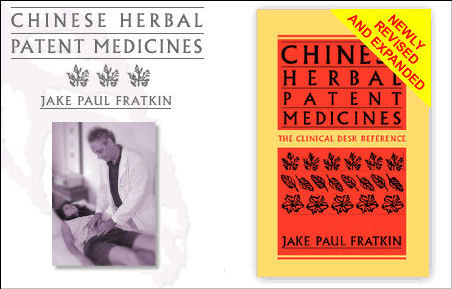Acupuncture & TCM Articles

Articles by Jake Paul Fratkin, OMD, LAc
Jake Fratkin, OMD, LAc, has been in the practice of Oriental medicine since 1978. Following undergraduate and graduate training at the University of Wisconsin in Chinese language and philosophy and pre-medicine, he pursued a seven-year apprenticeship in Japanese and Korean style acupuncture with Dr. Ineon Moon and a two-year apprenticeship in Chinese herbal medicine with Drs. Zhengan Guo and Pak-Leung Lau in Chicago. He also spent a year in Beijing hospitals interning in advanced herbal medicine, specializing in gastrointestinal and respiratory disorders, and pediatrics.  Dr. Fratkin is the author of several books, including Chinese Herbal Patent Medicines: The Clinical Desk Reference, and is the editor-organizer of Wu and Fischer's Practical Therapeutics of Traditional Chinese Medicine. In 1999, he was named the "Acupuncturist of the Year" by the American Association of Oriental Medicine.
Dr. Fratkin is the author of several books, including Chinese Herbal Patent Medicines: The Clinical Desk Reference, and is the editor-organizer of Wu and Fischer's Practical Therapeutics of Traditional Chinese Medicine. In 1999, he was named the "Acupuncturist of the Year" by the American Association of Oriental Medicine.
Chinese Herbal Patent Medicines: The Clinical Desk Reference
Hardback book, 1198 pages. This volume covers 1360 products, including 550 GMP level products and all of California FDB analysis on 505 products. Includes information on endagered animals, heavy metals, and pharmaceuticals. The text is organized into 12 groups, with a total of 109 chapters and includes material by Andrew Ellis, Subhuti Dharmananda, and Richard Ko. Over 80 pages of full-color photos (with English and Chinese cross-reference). Fully indexed.
Meridian Therapy for Health
I would like to take a minute to talk about using acupuncture to prevent illness and maintain optimal health. Patients often fail to realize that, while symptomatic treatment of acute and chronic conditions is essential, the same tools can be used to maintain balance, prevent disease, and promote optimal well-being.
Most of my patients come to me for help with annoying or debilitating symptoms, including acute fever, sore throat or cough; or chronic problems such skin conditions, painful joints, recurring headaches or menstrual disorders. One of my primary areas of concern is “leaky gut syndrome’, where the body becomes toxic and impaired due to intestinal toxins flooding into the organs and tissues. This is often due to Candida, a fungus, which proliferates after the use of antibiotics.
Introduction to Meridian Therapy
 
In all of these cases I combine the natural therapeutics of Chinese herbs, acupuncture, and nutritional medicines. My approach is holistic: I look for the interconnectedness of various symptoms, and I use therapies which promote genuine and deep healing without causing side-effects. I am happy that this approach works for most cases, and I feel that many of my patients are happy with the results. Their confidence in my approach is confirmed when patients return in the event of a new complaint or health crisis.
My work is greatly aided through the use of the Vegatest machine which I use for electrodermal testing. I sometimes lose sight of what a great tool this has been. It allows us to choose the more effective natural medicines, avoiding trial and error, and promoting a faster recovery. I am one of the few practitioners using electrodermal testing to integrate Chinese herbal medicine with nutritional medicine.
In the absence of a specific health complaint, meridian therapy acupuncture can significantly maintain health and prevent disease without using supplements. Meridian therapy is a school of acupuncture developed in Japan as a revival of a very old classical approach. In meridian therapy, we determine which of the twelve acupuncture channels are out of balance in terms of excess and deficiency. These are brought back into balance with a minimum number of needles, using superficial painless needle insertion. The classical approach requires pulse diagnosis at each stage of needle placement. I have developed a muscle-testing technique which allows me to fine tune and speed the treatment by confirming exactly which acupuncture points are excess or deficient.
Balancing the channels is the first part of the session, and is called the root treatment. The second part, the branch treatment, treats any specific complaint the patient might have at the time, and addresses blockages and restrictions on the back and spine. The overall result of balancing the channels and releasing areas of restriction is to promote one´s health at a deep level: it adjusts the energetics of each organ so that it functions optimally, it aligns the fascia controlling the muscles and skeleton, and allows a free circulation of qi (energy) and blood throughout the body.
In order to better illustrate this method, I would like to mention the case of one of my patients, who is a nurse with diabetes. On several occasions, she would measure her blood for glucose with a finger-prick machine immediately before and immediately after a meridian therapy treatment. On each occasion, there would be a drop in her blood sugar of 35 points, which is quite significant. This demonstrates the speed with which the body responds to the treatment.
In Oriental medicine, all disease and pain is due to one of two underlying conditions: that the qi and blood is not circulating well, or that the qi and blood has a poor quality. Meridian therapy prevents disease by allowing a normal unrestricted flow of qi and blood through the channels, and by boosting the vitality of the qi. When qi and blood move in a balanced and free-flowing manner, all organs and tissues along the path of the channels are revived, tuned, and empowered. This is preventative medicine at its deepest level. Following treatment, patients report feeling balanced, focused, and more alive.
Japanese meridian therapy is an art that takes years to master. Not only does it require precise pulse diagnosis and point location by energetic sense, but the overall effect is dependent on how well the practitioner guides his or her energy through the needle and up the channel. I have found that my years of qigong training helps me to attain good results with treatment because it has taught me to develop, focus and move my energy through the acupuncture needles.
How often should one have meridian therapy? In the absence of other health complaints, I recommend once a month. This can balance and circulate your energy and maintain your health and vitality without having to take a regimen of vitamins or herbs. The essence of Oriental medicine is this: promoting and circulating the flow of qi and blood is the key to health and longevity.
 
| 